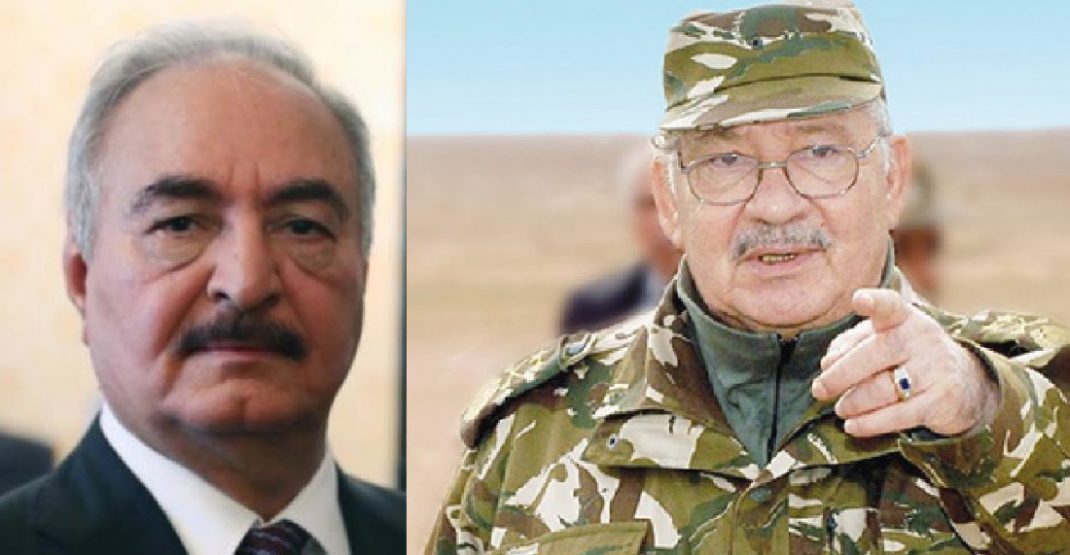By Usama Agag
The crisis caused by the video of Libya’s General Khalifa Haftar in which he threatened to move the war to Algerian territory appears to have calmed down.
Neither side wants to escalate matters, but the messages exchanged between them do not hide the lack of trust between the two sides.
Algeria is dealing with Haftar as a fait accompli and part of the conflict with Libya, without recognising that what he is trying to promote is the belief that he is part of the solution for the Libyan conflict and is able to unite the Libyan army.
It seems that Haftar’s people were surprised by the emergence of a video on Al-Jazeera in which the supposedly retired general stands with a group of his supporters and threatens Algeria with a war on the pretext that it is exploiting the security situation in Libya.
He mentions the possibility of moving the war to the Algerian border in minutes as a result of Algerian soldiers crossing into Libya.
The consequences of the crisis grew with Haftar’s talk about an official Algerian apology being made to him.
The details of the whole incident are rather ambiguous, as neither side gave an exact date for when the Algerian forces crossed the border, or when Haftar himself said what he did. However, that did not stop the crisis developing.
The facts on the ground indicate that Haftar’s people are rushing to reduce the impact of his statements, according to the spokesman of his forces, General Ahmed Al-Mismari.
“The Libyans and Algerians are brothers in the same trenches and are linked by political and social relations,” Al-Mismari told a press conference last week.
He also noted that their forces discovered that some members of the Algerian army entered Libyan territory, but after contacting the authorities they realised that they were gendarmes who crossed the border by mistake.
Haftar tried to deny the whole issue through his media officer, Khalifa Al-Obeidi.
The Government of National Accord in Tripoli, meanwhile, tried to distance itself from Haftar’s position.
Foreign Minister Mohammed Tahir Sayala contacted his counterpart in Algeria, Abdelkader Messahel, and condemned Haftar’s remarks as “irresponsible”.
He also noted that Libya is committed to its brotherly and historical relations with Algeria.
Messahel reassured Sayala that no statement of any kind could affect the strong relations between the two countries.
Haftar’s comments are reminiscent of a previous attack on Algeria during the 2011 uprising against Gaddafi, when Haftar accused Algeria of providing armed militias to support the Libyan leader.
Furthermore, any Algerian reaction now will be sensitive to the statement made by Haftar’s supporters in the House of Representatives last year in which they rejected Messahel’s visit to Ubari, Ghat, Zintan and Sabha, describing it as interference in Libyan affairs.
Algeria was later than other states in dealing with Haftar. They eventually received him in December 2016 as an important Libyan figure, but not the leader of the Libyan army.
It is said that officials insisted that he must not wear his general’s uniform during the visit.
The government in Algiers also welcomes Haftar’s rivals in official Libya institutions such as the House of Representatives, the Council of State and the Presidential Council.
It seems that Algeria’s position on the crisis does not appeal to Haftar or to other parties that may have provided him with information and pictures related to the gendarmerie mistakenly crossing the border.
Such information prompted him to make his threats, on the basis of the reservations that Haftar and those behind him have about Algeria’s position on the Libyan crisis.
Libya’s neighbour calls for an end to the fighting and does not to take sides with any factions.
Since the beginning of the crisis, Algeria has worked towards a peace deal and has rejected the calls made to exclude the Islamists or Gaddafi supporters from any talks to resolve the crisis.
Algeria also rejects any foreign intervention and the division of Libya.
His verbal attack on Algeria may be a ploy to cover up Haftar’s recent political and military failures.
He has lost momentum and his efforts to unify the military and solve the conflict in his favour have stalled.
Given the fact that Libya is on the verge of presidential elections, it looks like his chances for success are limited.
***
Translated from Arabi21, 20 September 2018
__________




